- Home
- Gerald Durrell
The Aye-Aye and I Page 3
The Aye-Aye and I Read online
Page 3
Meanwhile, Mihanta had discovered by some mysterious means that a cousin of his living in a village some three miles away had a gentle lemur in her possession and so we drove there to see if this were true. As soon as we got there Mihanta left the car and vanished like a wraith of smoke in that silent, unnerving way the Malagasy have, to reappear triumphantly carrying a raffia bag in which crouched a sub-adult lemur, terrified out of its wits. It transpired that Mihanta’s cousin had gone to market that day and had found four or five live lemurs on sale as food items. She had purchased one for the generous sum of seventy-five pence, thinking it might make a suitable casserole for her husband. We reimbursed her the purchase price while explaining that it was illegal to kill, capture or eat these animals – a fact of which she was unaware and which she was astonished to learn.
It was a typical example of an animal being given what I call ‘paper protection’. This happens not just in Madagascar but all over the world. A law is passed for the protection of a species but the inhabitants of the country are not told of the law, and there is no money to provide the infrastructure to enforce this law. Thus, to all intents and purposes, the law is useless.
The poor little creature was so scared that I decided not to subject it to further stress by transferring it from the bag to our travelling crate. Lee sat holding the raffia bag on her lap, clasping the mouth of it firmly in case the lemur should make a sudden bid for liberty. I decided that, owing to my somewhat precarious state of health, we should now return to our hotely, where I would have access to some more or less civilised amenities. As we were bowling along in the gloaming, a man suddenly leapt out into the middle of the road and started windmilling his arms at us. Fortunately, one of the few things that did work on Romulus’ car were the brakes, but even so this man came closer to death than I would care to be. He informed us that in a village about a quarter of a mile up the road there were three captive lemurs.
Against my better judgement we turned off the highway and bumped and joggled our way down an atrocious road that finally ended in the main square of a quite substantial village. We came to a standstill and I suggested that, owing to her command of French, Lee should go and look at the lemurs, if indeed there were any, and report back to me. She dumped the raffia bag containing our first prize in my lap and vacated the car together with everyone else. They all simply vanished like assistants in a conjuring trick.
So there I sat, holding closed a raffia bag containing a gentle lemur on my lap while the car quickly and miraculously became surrounded by some two hundred Malagasy children and a flock of thirty geese. At this point two things happened simultaneously: the lemur woke up and decided to make a dash for freedom and my stomach cramps returned with even more viciousness. I was in urgent need of a quiet place to contemplate what appeared to be my imminent demise. I was also in urgent need of a method of retaining the lemur. If I released my grip on the mouth of the bag the lemur would leap out into the car and, as all the windows were down and there was no method of closing them, it would be out into the countryside in a trice. I could explain my plight to no one, for my audience of two hundred children, who were regarding this strange, bearded vazaha (Malagasy for a white person) with the wide-eyed attention that normally one would accord a visitor from Mars, of course only spoke Malagasy, a language not included in my repertoire of tongues. The geese regarded me with interest, honking gently, but were not of any substantial help.
Surrounded by this sea of enchanting black faces, with their astonished black eyes as big as saucers, and an attendant chorus of geese, I reproached myself, as I have done many times, for being so idiotic. As the lemur intensified its efforts to part company with me, and as my stomach cramps grew so bad I felt that someone was operating on my nether regions with a blunt chain-saw, I reviewed my life.
Why, I asked myself, do you do this to yourself? At your age you should know better and stop acting as if you were still twenty-one. Why don’t you retire as other men do and take up golf, bowls or soap-carving? Why do you flagellate yourself in this way? Why did you marry a much younger wife who encourages you in these ridiculous acts? Why don’t you just commit suicide?
But if I do that, I thought, the lemur will escape. So I came full circle. Pausing at that philosophical point in my meditation, I saw Romulus at the far end of the village street and, without thinking about the effect it might have, I stuck my head out of the car window and yelled, ‘Romulus – ici – très vite!’
The children were transformed from immobile, fascinated spectators into a terrified mob. Screaming, they fled in all directions, rushing down alleyways, bursting through doors into the safety of huts, as if the Great White Devil Vazaha was after them. The geese, hitherto placid, raised their wings like tombstone angels and, honking like ancient cars in their panic, chased after the children, even rushing into the huts, to be summarily ejected moments later. I have never, in my entire life, effected such a complete and absolute rout on a group of mammals and birds. Romulus came at the run, a look of acute alarm on his face.
‘Monsieur,’ he said, panting. ‘Qu ’est-ce que vous désirez?’
‘I desire ma femme, tout de suite,’ I replied.
He vanished and returned in the space of a few seconds with an alarmed Lee.
‘What’s the matter?’ she asked.
‘I cannot cope with acute tummy trouble and a recalcitrant lemur at the same time,’ I said. ‘Let’s put it in its bag into the travelling crate. I can’t think why we didn’t do that in the first place.’
This, and other things, were accomplished, but I fear it will take many years to eradicate from those unfortunate children’s minds the picture of the horrifying, roaring, bearded vazaha. I am sorry about this, for they deserve better memories of the white races than I, unfortunately, was in a position to give them.
We got back to our hotely and smuggled our lemur in. Over the years I have found that certain hotels object to your keeping a baby warthog in your room, or fuss because you put snakes in the bath. It is a short-sighted policy which will not bring them custom, in my considered opinion. One is reduced to the vulgar level of a smuggler, having, by subterfuge, to insert a creature into one’s room without making the management privy to one’s designs. It is a hazardous business. For example, a charming South American maid once narrowly missed having a cardiac arrest when she discovered that I was sharing my bed not with my wife or mistress (which would have been acceptable) but with a baby Giant anteater.
The lemur, now that we could see him properly, was about the size of a half-grown cat, with bronzy-greenish fur, huge golden eyes and enormous hands and feet. We had stopped briefly on the way back so that Mihanta could collect some succulent reed and some papyrus. Lee mixed this with some chopped carrot and banana. The sooner you can get a newly caught animal to extend its menu, the easier your task becomes. We could not get that particular species of reed nor, for that matter, papyrus in Jersey, so the sooner we could introduce the creature to such things as bananas and carrots the better it would be. When Lee opened the door of the cage to present the plate of foodstuffs to the animal, it backed into a corner, stood up on its hind legs, eyes blazing, mouth open, arms held wide as if to embrace her.
‘There doesn’t seem to be anything gentle about this lemur,’ I remarked as the animal yapped at Lee like an infuriated toy dog.
‘Well, you can hardly blame the poor little thing,’ said Lee. ‘How would you feel if you’d narrowly escaped being put in a casserole?’
I had to admit she had a point.
While I sat on our fakir’s bed and swallowed quantities of antibiotics aided by quantities of Scotch, Lee went out to the market across the road to see if she could find any more tasty fruit or vegetables to extend the menu available to our new acquisition. The moment silence descended on the room, I heard a scrabbling in the cage, followed by the satisfactory scrunching noises of the lemur feeding. This was a joyous sound, for sometimes a newly caught animal will suffer a self-i
nflicted fast for twenty-four hours or longer simply because of stress. If this fast lasts too long, endangering the animal’s life, it may have to be released. But an animal which starts feeding at once is more than halfway to reconciling itself to captivity.
Having fed well and noisily, the lemur moved about the cage, exploring, uttering almost inaudible little interrogative mews like a kitten, followed by a long silence. Then, suddenly, it started making the most extraordinary noise that can only be written down as ‘yourp’. It sounded like someone pulling a cork out of a small bottle and the first time I heard it I wondered for a moment if Lee, out of the kindness of her heart, had put a small bottle of champagne in the cage with the creature. However, it went on popping corks at regular intervals and I decided that this was a communication signal. In the dense reed beds it is possible that the popping noise carries better than any other sound and this enables the troop to keep in touch without necessarily being visible to each other.
Over the time we had this lemur and others of its kind I was intrigued by their extensive vocabularies, the popping noise, cat-like mews and purrs, yaps like a dog and growls like a mini tiger. The following morning we found to our delight that our first specimen had eaten all the vegetation we had put into the cage, as well as some carrot and half a banana. When Lee fed him, although he still stood on his hind legs, arms outstretched, mouth open as a warning, he did not yap, which was another good sign.
Mihanta told us that the following day we would be transported by Romulus to the eastern shore of the lake where there was a dense concentration of villages. Here, he was sure, we would find a mate for our lemur and maybe some other specimens as well.
Chapter Two
A Flood of Lemurs
The next morning, while I breakfasted on equal parts antibiotics and fried eggs, I people-watched through the restaurant window. Romulus had sent a message to say that his car – not altogether surprisingly – had broken down and that he would be late. This gave me an hour to feast my eyes on the market, which had started at four that morning and was now in full swing. Lee had joined the throng in search of baskets with lids to house any future lemurs we might find, and I enjoyed myself by doing some sketching. As I watched I was able to observe the many purposes for which that item of clothing called the lamba can be used.
The lamba is a piece of cotton four feet by eight and covered with an intricate and highly coloured pattern. In my young days, it used to be called a sarong and was worn by Miss Dorothy Lamour, but she used it merely to embellish her manifold attractions. In the market at Ambatondrazaka I saw its uses can be more practical. Firstly, you can wrap it round yourself in order to carry your baby on your back, like a sort of outside womb. If you have no baby you can carry small sacks of rice, or chickens and ducks in the same way or, indeed, transport your lunch in it. It can be used as a dress, a cloak or a hood to keep off the sun, or as a loincloth. It provides a light, warm cover when you sleep and, last but by no means least, it makes you look pretty.
The Malagasy women are small, delicately boned and walk more gracefully than any ballet dancer I have ever seen, with a magnificent carriage developed from the fact that from infancy they carry things on their heads. Here in Ambatondrazaka, with their rainbow-hued lambas clinging to all their curves, their dazzling, white straw hats tilted rakishly, they were breathtakingly beautiful. The weights that some of them carried on their heads were astonishing and I wondered how those slender necks could survive without snapping like the stalk of a flower. I saw one lady with a huge basket full of sweet potatoes. It required the help of two of her friends to hoist this burden onto her head and once it was there and settled to her satisfaction she simply walked off down the road as smoothly and effortlessly as a stone gliding on ice. Another lady presented a curious sight, for in the large basket on her head she had two geese. The birds were hidden from the neck down, so it looked as if, in some miraculous way, the basket had sprouted two honking heads.
As I sat in the bar/restaurant a constant stream of people came in with produce to sell to the patron’s wife, who acted as bartender. One minute it would be a great tin bowl of fish, the next a covey of squawking upside-down chickens, or else the haunch of a zebu, or a dozen or so eggs. Madame would inspect each offering minutely and either send it through to the kitchen or dismiss the hopeful vendor with a wave of her hand.
While watching this fascinating and colourful pageant, I was joined by Araminta and Edward, friends of ours who had decided to take a holiday and join us, for they are staunch supporters of our work and wanted to see how the collecting was done. Edward’s great-uncle, Herbert Whitley, had founded and built the zoological gardens at Paignton in Devon and, in times past, had acquired many specimens from me to add to his collection. He was a wonderful, eccentric naturalist of a sort that only seem to flourish in England and he had a magic touch with all creatures, breeding in his zoo animals that nobody else could even keep alive. Physically, Edward resembled his great-uncle in many ways. He was tall and well-built, with a certain distinctive tilt of the head and a beguiling, innocent, anyone-for-tennis look belied by the determination of his jawline. Araminta, with her smoky, dark good looks and appraising eyes, was a perfect match for her exuberant mate, and I loved the fact that she had been bestowed with such a wonderful Victorian title for, to my regret, some of these lovely old names have gone out of fashion.
On their arrival, jet-lagged and exhausted, two days before, I had greeted them by immediately passing on to Araminta the offspring of whatever bug I was suffering from. She would only forgive me for this unfriendly gesture on condition that I promised to call our first two lemurs Araminta and Edward and, of course, I agreed. Meanwhile, Araminta and I kept going back and forth from the ‘comfort station’, like the two little figures who pop alternately in and out of those tiny wooden Swiss chalets that you buy to predict the weather.
‘How are you today?’ I enquired.
‘Splendid! Splendid!’ said Edward, with all that awful exuberance displayed by the young and healthy at breakfast time. Araminta merely gave me a frigid look.
‘What you need is some breakfast,’ said Edward, looking at her inquiringly, ‘have some chop suey with three or four fried eggs on it. It’s delicious.’
‘No, thank you,’ said Araminta, turning white. ‘I’ll just have some tea.’
‘What’s the programme?’ asked Edward, engulfing chop suey like one of the larger and less restrained herbivores.
I explained about Romulus’ car having broken down.
‘Broken down?’ said Edward. ‘I wonder it goes at all, let alone breaks down.’
‘They’ll probably be about an hour,’ I said. ‘So what will you all do?’
‘Go Christmas shopping,’ said Edward.
‘Go Christmas shopping? Here?’ I said.
‘Well, we won’t have time when we get back to England, so we thought we’d see what the market had to offer,’ explained Araminta.
‘They’ve got some nice chickens and geese,’ I said judiciously, ‘or did you have pigs in mind? I saw five baby pigs just now, all different colours and about the right size to fit in your rucksack.’
‘Thank you, but my thoughts were running more on the lines of baskets and lambas,’ she said with dignity.
So, while I continued to watch the market, the two of them went off Christmas shopping in that most unlikely of places. Eventually, they returned laden down with a selection of colourful lambas and baskets of all descriptions: some round and fat with lids, others square, others like gaudy Martello towers – around the lake the weaving is some of the best in Madagascar – fine and tight and shiny, like beautiful biscuits with intricately worked out patterns in different colours. As we examined these beautiful prizes, Lee returned with her own supply of baskets, not as upmarket as Araminta’s but still very lovely.
At long last, Romulus and Mihanta arrived, full of apologies, and we set off to the eastern part of the lake. Driving here was much less depres
sing than in the western part. In places, the farms were quite well wooded, whereas on the western side any tree we saw would be greeted like a long-lost friend. We struck lucky at the first village we came to. As soon as we stopped in the main square, Mihanta disappeared like a will-o’-the-wisp only to reappear ten minutes later carrying a basket containing a baby gentle lemur. It would just about have fitted into a teacup and was a most appealing little thing, with its huge head and large hands and feet. We had wanted to collect only sub-adult and adult specimens, but in no way could we bring ourselves to leave this pitiful scrap in the hands of its present owners. In the basket with him was only an unhygienic bit of overripe banana and I felt sure – in spite of his owner’s protestations to the contrary – that he was not yet weaned: at that age, a diet of semi-rotten fruit would be sure to kill him. We purchased him for a very small sum of money and lectured his erstwhile owners on the law. Did they not know that it was illegal to kill or capture these animals? Oh yes, they admitted, they knew that but, as no one ever came to enforce the law, what was the point of obeying it? This sort of attitude, which one meets all over the world, is what makes conservation work so very frustrating.
We were just making our way out of the village when we were flagged down and another three baby lemurs were produced. They were slightly older than the one we had purchased and I judged them to be at least partially weaned. Again, we could not bear to leave them in conditions that would surely bring about their death, so we bought them and, after another lecture on the law, we left with four baby lemurs in our possession.

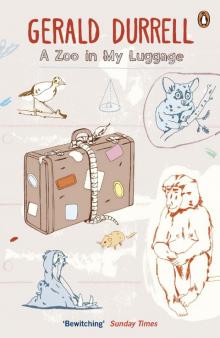 A Zoo in My Luggage
A Zoo in My Luggage The New Noah
The New Noah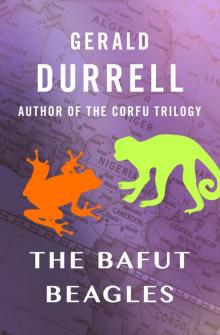 The Bafut Beagles
The Bafut Beagles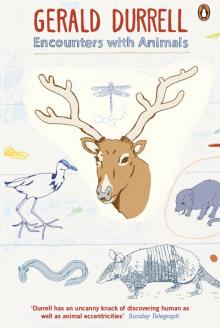 Encounters With Animals
Encounters With Animals Catch Me a Colobus
Catch Me a Colobus Menagerie Manor
Menagerie Manor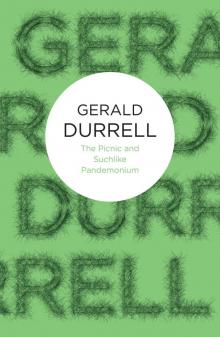 The Picnic and Suchlike Pandemonium
The Picnic and Suchlike Pandemonium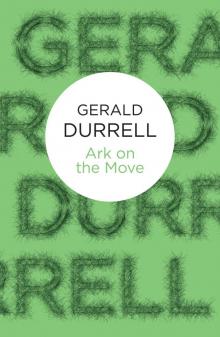 Ark on the Move
Ark on the Move My Family and Other Animals
My Family and Other Animals Two in the Bush (Bello)
Two in the Bush (Bello) The Stationary Ark
The Stationary Ark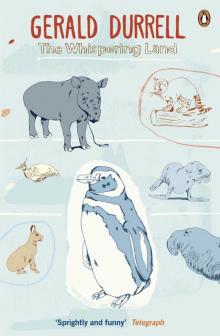 The Whispering Land
The Whispering Land Three Singles to Adventure
Three Singles to Adventure Fillets of Plaice
Fillets of Plaice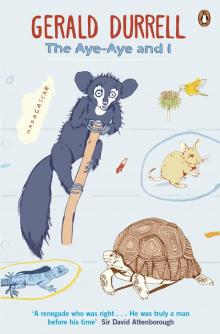 The Aye-Aye and I
The Aye-Aye and I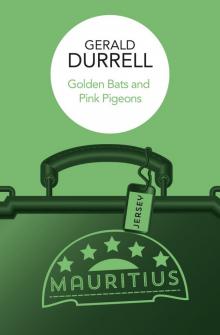 Golden Bats & Pink Pigeons
Golden Bats & Pink Pigeons The Drunken Forest
The Drunken Forest Marrying Off Mother: And Other Stories
Marrying Off Mother: And Other Stories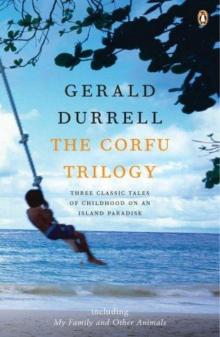 The Corfu Trilogy (the corfu trilogy)
The Corfu Trilogy (the corfu trilogy) The Corfu Trilogy
The Corfu Trilogy Marrying Off Mother
Marrying Off Mother Two in the Bush
Two in the Bush